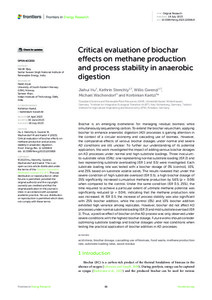Datum
2023-07-18Schlagwort
500 Naturwissenschaften 570 Biowissenschaften, Biologie GärungMethangärungPflanzenkohleWirkungBewertungMetadata
Zur Langanzeige
Aufsatz

Critical evaluation of biochar effects on methane production and process stability in anaerobic digestion
Zusammenfassung
Biochar is an emerging biomaterial for managing residual biomass while simultaneously sequestering carbon. To extend the biochar value chain, applying biochar to enhance anaerobic digestion (AD) processes is gaining attention in the context of a circular economy and cascading use of biomass. However, the comparative effects of various biochar dosages under normal and severe AD conditions are still unclear. To further our understanding of its potential application, this work investigated the impact of adding various biochar dosages on AD processes under normal and high substrate loadings. Three inoculum-to-substrate ratios (ISRs): one representing normal substrate loading (ISR 2) and two representing substrate overloading (ISR 1 and 0.5) were investigated. Each substrate loading rate was tested with a biochar dosage of 0% (control), 10%, and 25% based on substrate volatile solids. The results revealed that under the severe condition of high substrate overload (ISR 0.5), a high biochar dosage of 25% significantly increased cumulative methane production by 5.6% (p = 0.06) when compared to the control. Under the same condition (ISR 0.5, 25%), the time required to achieve a particular extent of ultimate methane potential was significantly reduced (p = 0.04), indicating that the methane production rate was increased. At ISR 0.5, the increase of process stability was also significant with 25% biochar addition, while the control (0%) and 10% biochar addition exhibited high variance among replicates. However, biochar did not affect AD processes under normal substrate loading (ISR 2) and mild substrate overload (ISR 1). Thus, a positive effect of biochar on the AD process was only observed under severe conditions with the highest biochar dosage. Future works should consider optimising substrate loadings and biochar dosages under real conditions when testing the practical application of biochar addition in AD processes.
Zitierform
In: Frontiers in energy research Volume 11 (2023-07-18) eissn:2296-598XFörderhinweis
Gefördert durch den Publikationsfonds der Universität KasselZitieren
@article{doi:10.17170/kobra-202307218431,
author={Hu, Jiahui and Stenchly, Kathrin and Gwenzi, Willis and Wachendorf, Michael and Kätzl, Korbinian},
title={Critical evaluation of biochar effects on methane production and process stability in anaerobic digestion},
journal={Frontiers in energy research},
year={2023}
}
0500 Oax
0501 Text $btxt$2rdacontent
0502 Computermedien $bc$2rdacarrier
1100 2023$n2023
1500 1/eng
2050 ##0##http://hdl.handle.net/123456789/14908
3000 Hu, Jiahui
3010 Stenchly, Kathrin
3010 Gwenzi, Willis
3010 Wachendorf, Michael
3010 Kätzl, Korbinian
4000 Critical evaluation of biochar effects on methane production and process stability in anaerobic digestion / Hu, Jiahui
4030
4060 Online-Ressource
4085 ##0##=u http://nbn-resolving.de/http://hdl.handle.net/123456789/14908=x R
4204 \$dAufsatz
4170
5550 {{Gärung}}
5550 {{Methangärung}}
5550 {{Pflanzenkohle}}
5550 {{Wirkung}}
5550 {{Bewertung}}
7136 ##0##http://hdl.handle.net/123456789/14908
<resource xsi:schemaLocation="http://datacite.org/schema/kernel-2.2 http://schema.datacite.org/meta/kernel-2.2/metadata.xsd"> 2023-07-21T11:46:50Z 2023-07-21T11:46:50Z 2023-07-18 doi:10.17170/kobra-202307218431 http://hdl.handle.net/123456789/14908 Gefördert durch den Publikationsfonds der Universität Kassel eng Namensnennung 4.0 International http://creativecommons.org/licenses/by/4.0/ acid stress biochar dosage cascading use of biomass food waste methane production rate substrate loading rates wood residue 500 570 Critical evaluation of biochar effects on methane production and process stability in anaerobic digestion Aufsatz Biochar is an emerging biomaterial for managing residual biomass while simultaneously sequestering carbon. To extend the biochar value chain, applying biochar to enhance anaerobic digestion (AD) processes is gaining attention in the context of a circular economy and cascading use of biomass. However, the comparative effects of various biochar dosages under normal and severe AD conditions are still unclear. To further our understanding of its potential application, this work investigated the impact of adding various biochar dosages on AD processes under normal and high substrate loadings. Three inoculum-to-substrate ratios (ISRs): one representing normal substrate loading (ISR 2) and two representing substrate overloading (ISR 1 and 0.5) were investigated. Each substrate loading rate was tested with a biochar dosage of 0% (control), 10%, and 25% based on substrate volatile solids. The results revealed that under the severe condition of high substrate overload (ISR 0.5), a high biochar dosage of 25% significantly increased cumulative methane production by 5.6% (p = 0.06) when compared to the control. Under the same condition (ISR 0.5, 25%), the time required to achieve a particular extent of ultimate methane potential was significantly reduced (p = 0.04), indicating that the methane production rate was increased. At ISR 0.5, the increase of process stability was also significant with 25% biochar addition, while the control (0%) and 10% biochar addition exhibited high variance among replicates. However, biochar did not affect AD processes under normal substrate loading (ISR 2) and mild substrate overload (ISR 1). Thus, a positive effect of biochar on the AD process was only observed under severe conditions with the highest biochar dosage. Future works should consider optimising substrate loadings and biochar dosages under real conditions when testing the practical application of biochar addition in AD processes. open access Hu, Jiahui Stenchly, Kathrin Gwenzi, Willis Wachendorf, Michael Kätzl, Korbinian doi:10.3389/fenrg.2023.1205818 Gärung Methangärung Pflanzenkohle Wirkung Bewertung publishedVersion eissn:2296-598X Frontiers in energy research Volume 11 false 1205818 </resource>
Die folgenden Lizenzbestimmungen sind mit dieser Ressource verbunden:


